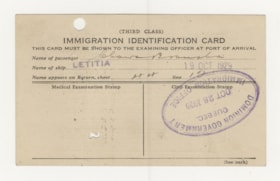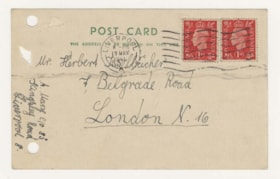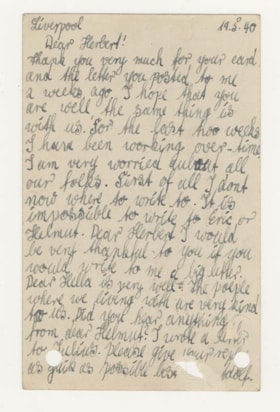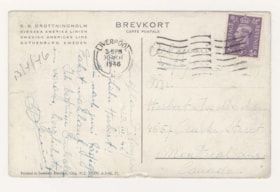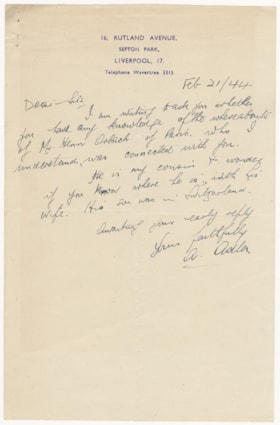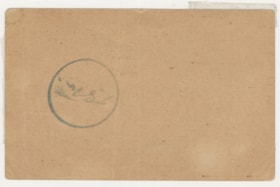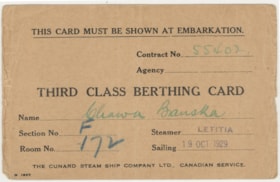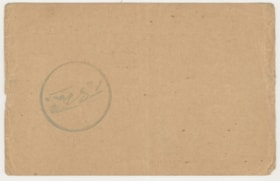Narrow Results By
Identification card
https://www.cjhn.ca/link/cjhn59529
- Collection
- Montreal Holocaust Museum
- Description Level
- Item
- Material Type
- textual record
- Physical Description
- Identification card : Paper : Printed, stamped : Ink : Purple, beige, black ; Ht: 8 cm x W: 12,5 cm
- Date
- October 19, 1929
- Collection
- Montreal Holocaust Museum
- Description Level
- Item
- Material Type
- textual record
- Physical Description
- Identification card : Paper : Printed, stamped : Ink : Purple, beige, black ; Ht: 8 cm x W: 12,5 cm
- Other Title Information
- Documentary Artifact
- Date
- October 19, 1929
- Physical Condition
- Good
- Language
- English
- Notes
- This is an Immigration Identification Card (third class), landing card. This Card had to be shown to the examining officer at port of arrival. The name of the ship was Letitia. It ran out of Liverpool on 19 October 1929 and arrived in Quebec City 28 October 1929.
- Accession No.
- 1990.62.36
- Name Access
- Briansky Prezament, Rita
- Places
- Liverpool, England, Europe
- Archival / Genealogical
- Archival Descriptions
- Repository
- Montreal Holocaust Museum
Images
Letter
https://www.cjhn.ca/link/cjhn50395
- Collection
- Montreal Holocaust Museum
- Description Level
- Item
- Material Type
- textual record
- Physical Description
- Letter : Paper : Ink : Black, Beige ; Ht: 25,4 cm x W: 20 cm
- Date
- February 14, 1944
- Collection
- Montreal Holocaust Museum
- Description Level
- Item
- Material Type
- textual record
- Physical Description
- Letter : Paper : Ink : Black, Beige ; Ht: 25,4 cm x W: 20 cm
- Other Title Information
- Documentary Artifact
- Date
- February 14, 1944
- Physical Condition
- Excellent
- Language
- English
- Notes
- 1 page, typed in the center of the page. Narrative: In the 1920’s Serge and Sophie Philipson (nee Orbach) left Berlin for Paris due to rising antisemitism. On July 15, 1930 their daughter Rachel was born. Serge, Sophie and Rachel were Polish citizen, they never got either the German or the French citizenship. In Paris, Serge worked for Les Modes Modernes, the hat factory of his brother-in-law, Henri. When an opportunity to expand the business in Ireland arose, Serge moved to Galway. The new factory opened in July 1938. In August 1939, Sophie, Rachel, and 4 other family members (Rachel’s cousin Stéphane, his maternal grandmother Néné, Serge’s sister Esther and Serge’s sister-in-law Choura) left for Cabourg, in Normandy. After the winter 1939-1940 it became difficult to communicate with Ireland but Rachel and Sophie could still send and receive letter from Serge. At the end of winter 1940, the group moved to Néris and in July 1940, after the occupation of France by Germany, they settled in the zone libre in the village of Cauterets, on the border with Spain. They were reunited with Robert, Serge’s brother. In August 1942, 4 family members (Sophie’s sister Ella and her husband Ernest, their daughter Ruth, Serge’s siblings Robert and Esther) were arrested by local police and deported. They were not seen again. At the beginning of 1943, Sophie, her mother Augusta and Rachel moved to Maubourguet. In April 1943, they moved to Cannes in Hotel Victoria with Henri, Stéphane and Néné. Henri, Sophie and Augusta went into hiding together while cousins Stéphane and Rachel were taken care of by Néné and returned to Maubourguet. In January 1944, Henri, Sophie and Augusta were denounced and arrested. They were transferred to Marseille before being sent by train to Drancy transit camp from where they were deported. It is believed they were killed in a Polish killing centre. In 1944, Rachel moved from one place to another – under a non-Jewish identity - and continued to correspond with her father. In June 1945, she reunited with her father Ireland. They had not seen each other for 6 years. In 1951, Rachel got married. In 1954, she immigrated to Montreal.
- Accession No.
- 2012X.20.34
- Name Access
- Levy, Rachel
- Places
- Liverpool, England, Europe
- Archival / Genealogical
- Archival Descriptions
- Repository
- Montreal Holocaust Museum
Images
Postcard
https://www.cjhn.ca/link/cjhn59396
- Collection
- Montreal Holocaust Museum
- Description Level
- Item
- Material Type
- textual record
- Physical Description
- Postcard : Cardstock : Handwritten : Ink : Beige, grey, red. ; Ht: 8,5 cm x W: 14 cm
- Date
- May 19, 1940
- Collection
- Montreal Holocaust Museum
- Description Level
- Item
- Material Type
- textual record
- Physical Description
- Postcard : Cardstock : Handwritten : Ink : Beige, grey, red. ; Ht: 8,5 cm x W: 14 cm
- Other Title Information
- Documentary Artifact
- Date
- May 19, 1940
- Physical Condition
- Good
- Language
- English
- Notes
- Blank postcard with printed address side, two postage stamps, and two holes punched on left edge. Informal postcard from Adolf Marx in Liverpool, U.K, to Herbert Isselbacher in London. Narrative: Isaac Herbert Isselbacher was born 1919-11-20 in Isselbach, Germany. His brother was Helmut Isselbacher, born 1921-12-20. Their father was Jacob Isselbacher, born 1883-08-05. They had an uncle and aunt, David and Betty Loewenstein, who lived in New York City with their two children. Isaac left Germany on 1939-07-29, hoping to join his relatives in NYC. He only had the time to get to London, England before the war broke out and started working in a factory. He was arrested at his workplace as an ‘enemy alien’ and sent to Canada for internment in 1940. Isaac was interned in Camp N in Sherbrooke, Quebec. He was drafted into the Works Program Division for woodworking and net-making. In 1940, he received a last letter from his parents which suggested their imminent deportation. After his release, circa November 1942, Isaac worked as a locksmith. He married Fanny Azeff on 1943-12-26 at the Bnai Jacob synagogue in Montreal. Fanny was born on 1921-12-23 in Canada, the daughter of Mr. and Mrs. Harry Azeff. Isaac was naturalized as a Canadian citizen on 1946-06-08. Fanny was naturalized on 1946-08-30 (she had lost her citizenship by marrying Isaac). Isaac’s brother, Helmut Isselbacher, was deported with Transport XXII A from Dossin casern in Mechelen (Malines), Belgium to Auschwitz Birkenau, Poland on 1943-09-20. Of the 2,450 people on the transport, 100 men were selected to work –including Helmut- and the remainder prisoners were gassed. Helmut was made to work as a welder, and was soon fitting new pipes for the gas chamber. He suffered a nervous breakdown as a result. As he was a valued welder, he was transferred to a labour camp in Upper Silesia (Poland) where he remained for two years. As the Russian army advanced, the 6,000 prisoners of this camp were evacuated by train. Helmut remembered being forced to march as the other prisoners died from exhaustion. When liberation was announced, the survivors travelled by ship from Luebeck, Germany, to Sweden with the aid of the Red Cross. After recovery, Helmut decided to remain in Sweden as a welder. Upon learning of his brother’s survival, Helmut travelled to New York in April 1946 to meet with him and their Loewenstein relatives. Afterwards, Helmut travelled to Canada bringing with him a washing machine and bras as late wedding presents for his brother and Fanny. By 1946-08-12, their parents were presumed dead and the two sons inquired into their estate. They received a deed for the land and travelled to the estate to discover that the current owner of their house was their old maid and her son had become the town mayor. Various disputes arose with the current ‘owners’ who believed the Isselbacher family dead. Isaac wished to discuss a settlement, but the mayor’s mother –not realizing Fanny understood German- called the neighbours at work to warn them not to come home as the Isselbacher sons had resurfaced. Payment for the land had reportedly been sent to Israel, though no documentation could be provided.
- Accession No.
- 1999.1.30
- Name Access
- Issley, Jason
- Places
- Liverpool, England, Europe
- Archival / Genealogical
- Archival Descriptions
- Repository
- Montreal Holocaust Museum
Images
Postcard
https://www.cjhn.ca/link/cjhn59499
- Collection
- Montreal Holocaust Museum
- Description Level
- Item
- Material Type
- textual record
- Physical Description
- Postcard : Cardstock : Printed, handwritten : Ink : Beige, black, white, purple, blue ; Ht: 9 cm x W: 14 cm
- Date
- March 29, 1946
- Collection
- Montreal Holocaust Museum
- Description Level
- Item
- Material Type
- textual record
- Physical Description
- Postcard : Cardstock : Printed, handwritten : Ink : Beige, black, white, purple, blue ; Ht: 9 cm x W: 14 cm
- Other Title Information
- Documentary Artifact
- Date
- March 29, 1946
- Physical Condition
- Good
- Language
- German
- Notes
- Postcard featuring the S.S. Drottningholm of the Swedish/American Line, stamp on back and message written vertically. Addressed from Helmut Isselbacher to his brother, Isaac Herbert Isselbacher. Helmut informs Herbert that he is maintaining good health even after being on the ship for two days. Narrative: Isaac Herbert Isselbacher was born 1919-11-20 in Isselbach, Germany. His brother was Helmut Isselbacher, born 1921-12-20. Their father was Jacob Isselbacher, born 1883-08-05. They had an uncle and aunt, David and Betty Loewenstein, who lived in New York City with their two children. Isaac left Germany on 1939-07-29, hoping to join his relatives in NYC. He only had the time to get to London, England before the war broke out and started working in a factory. He was arrested at his workplace as an ‘enemy alien’ and sent to Canada for internment in 1940. Isaac was interned in Camp N in Sherbrooke, Quebec. He was drafted into the Works Program Division for woodworking and net-making. In 1940, he received a last letter from his parents which suggested their imminent deportation. After his release, circa November 1942, Isaac worked as a locksmith. He married Fanny Azeff on 1943-12-26 at the Bnai Jacob synagogue in Montreal. Fanny was born on 1921-12-23 in Canada, the daughter of Mr. and Mrs. Harry Azeff. Isaac was naturalized as a Canadian citizen on 1946-06-08. Fanny was naturalized on 1946-08-30 (she had lost her citizenship by marrying Isaac). Isaac’s brother, Helmut Isselbacher, was deported with Transport XXII A from Dossin casern in Mechelen (Malines), Belgium to Auschwitz Birkenau, Poland on 1943-09-20. Of the 2,450 people on the transport, 100 men were selected to work –including Helmut- and the remainder prisoners were gassed. Helmut was made to work as a welder, and was soon fitting new pipes for the gas chamber. He suffered a nervous breakdown as a result. As he was a valued welder, he was transferred to a labour camp in Upper Silesia (Poland) where he remained for two years. As the Russian army advanced, the 6,000 prisoners of this camp were evacuated by train. Helmut remembered being forced to march as the other prisoners died from exhaustion. When liberation was announced, the survivors travelled by ship from Luebeck, Germany, to Sweden with the aid of the Red Cross. After recovery, Helmut decided to remain in Sweden as a welder. Upon learning of his brother’s survival, Helmut travelled to New York in April 1946 to meet with him and their Loewenstein relatives. Afterwards, Helmut travelled to Canada bringing with him a washing machine and bras as late wedding presents for his brother and Fanny. By 1946-08-12, their parents were presumed dead and the two sons inquired into their estate. They received a deed for the land and travelled to the estate to discover that the current owner of their house was their old maid and her son had become the town mayor. Various disputes arose with the current ‘owners’ who believed the Isselbacher family dead. Isaac wished to discuss a settlement, but the mayor’s mother –not realizing Fanny understood German- called the neighbours at work to warn them not to come home as the Isselbacher sons had resurfaced. Payment for the land had reportedly been sent to Israel, though no documentation could be provided.
- Accession No.
- 1999.1.1193
- Name Access
- Issley, Jason
- Places
- Liverpool, England, Europe
- Archival / Genealogical
- Archival Descriptions
- Repository
- Montreal Holocaust Museum
Images
Telegram
https://www.cjhn.ca/link/cjhn50394
- Collection
- Montreal Holocaust Museum
- Description Level
- Item
- Material Type
- textual record
- Physical Description
- Telegram : Paper : Ink : Black, Beige ; Ht: 22,7 cm x W: 14,7 cm
- Date
- February 02, 1944
- Collection
- Montreal Holocaust Museum
- Description Level
- Item
- Material Type
- textual record
- Physical Description
- Telegram : Paper : Ink : Black, Beige ; Ht: 22,7 cm x W: 14,7 cm
- Other Title Information
- Documentary Artifact
- Date
- February 02, 1944
- Physical Condition
- Excellent
- Language
- English
- Notes
- 1 page, right side aligned, with a letter head at the top. Narrative: In the 1920’s Serge and Sophie Philipson (nee Orbach) left Berlin for Paris due to rising antisemitism. On July 15, 1930 their daughter Rachel was born. Serge, Sophie and Rachel were Polish citizen, they never got either the German or the French citizenship. In Paris, Serge worked for Les Modes Modernes, the hat factory of his brother-in-law, Henri. When an opportunity to expand the business in Ireland arose, Serge moved to Galway. The new factory opened in July 1938. In August 1939, Sophie, Rachel, and 4 other family members (Rachel’s cousin Stéphane, his maternal grandmother Néné, Serge’s sister Esther and Serge’s sister-in-law Choura) left for Cabourg, in Normandy. After the winter 1939-1940 it became difficult to communicate with Ireland but Rachel and Sophie could still send and receive letter from Serge. At the end of winter 1940, the group moved to Néris and in July 1940, after the occupation of France by Germany, they settled in the zone libre in the village of Cauterets, on the border with Spain. They were reunited with Robert, Serge’s brother. In August 1942, 4 family members (Sophie’s sister Ella and her husband Ernest, their daughter Ruth, Serge’s siblings Robert and Esther) were arrested by local police and deported. They were not seen again. At the beginning of 1943, Sophie, her mother Augusta and Rachel moved to Maubourguet. In April 1943, they moved to Cannes in Hotel Victoria with Henri, Stéphane and Néné. Henri, Sophie and Augusta went into hiding together while cousins Stéphane and Rachel were taken care of by Néné and returned to Maubourguet. In January 1944, Henri, Sophie and Augusta were denounced and arrested. They were transferred to Marseille before being sent by train to Drancy transit camp from where they were deported. It is believed they were killed in a Polish killing centre. In 1944, Rachel moved from one place to another – under a non-Jewish identity - and continued to correspond with her father. In June 1945, she reunited with her father Ireland. They had not seen each other for 6 years. In 1951, Rachel got married. In 1954, she immigrated to Montreal.
- Accession No.
- 2012X.20.33
- Name Access
- Levy, Rachel
- Places
- Liverpool, England, Europe
- Archival / Genealogical
- Archival Descriptions
- Repository
- Montreal Holocaust Museum
Images
Ticket
https://www.cjhn.ca/link/cjhn76140
- Collection
- Montreal Holocaust Museum
- Description Level
- Item
- Material Type
- textual record
- Physical Description
- Ticket : Paper : Printed, Handwritten, Stamped : Ink : Beige, Black, Green, Blue ; Ht: 3 3/4 in. x W: 5 3/4 in.
- Date
- October 19, 1929
- Collection
- Montreal Holocaust Museum
- Description Level
- Item
- Material Type
- textual record
- Physical Description
- Ticket : Paper : Printed, Handwritten, Stamped : Ink : Beige, Black, Green, Blue ; Ht: 3 3/4 in. x W: 5 3/4 in.
- Other Title Information
- Exchange Medium
- Date
- October 19, 1929
- Physical Condition
- Good
- Language
- English
- Notes
- 1 page, double-sided. Document is a third-class berthing card for Rywka Branska for the steamship Letitia, sailing October 19, 1929. On verso, there is a circle in blue ink with some illegible writing within it (possibly a signature). Narrative: Card was used by the donor, Rywka Branska (Rebecca Briansky), during her immigration to Canada. Born in Grajewo, Poland, she travelled to Quebec City with her mother and two sisters (Bella and Rita) in 1929. Her father had immigrated 1.5 years prior. Upon arrival in Quebec City, they joined Mr. Branska in Ansonville, Ontario.
- Accession No.
- 1990.60.09
- Name Access
- Briansky Duchow, Rebecca
- Places
- Liverpool ?, England, Europe
- Archival / Genealogical
- Archival Descriptions
- Repository
- Montreal Holocaust Museum
Images
Ticket
https://www.cjhn.ca/link/cjhn76141
- Collection
- Montreal Holocaust Museum
- Description Level
- Item
- Material Type
- textual record
- Physical Description
- Ticket : Paper : Printed, Handwritten, Stamped : Ink : Beige, Black, Green, Blue ; Ht: 3 3/4 in. x W: 5 3/4 in.
- Date
- October 19, 1929
- Collection
- Montreal Holocaust Museum
- Description Level
- Item
- Material Type
- textual record
- Physical Description
- Ticket : Paper : Printed, Handwritten, Stamped : Ink : Beige, Black, Green, Blue ; Ht: 3 3/4 in. x W: 5 3/4 in.
- Other Title Information
- Exchange Medium
- Date
- October 19, 1929
- Physical Condition
- Good
- Language
- English
- Notes
- 1 page, double-sided. Document is a third-class berthing card for Chawa Branska for the steamship Letitia, sailing October 19, 1929. On verso, there is a circle in blue ink with some illegible writing within it (possibly a signature). Narrative: Card was used by the donor, Chawa Branska (Eva Briansky), during her immigration to Canada. Born in Grajewo, Poland, she travelled to Quebec City with her three daughters Rebecca, Bella and Rita in 1929. Her husband had immigrated 1.5 years prior. Upon arrival in Quebec City, they joined Mr. Branska in Ansonville, Ontario.
- Accession No.
- 1990.62.33
- Name Access
- Briansky Prezament, Rita
- Places
- Liverpool ?, England, Europe
- Archival / Genealogical
- Archival Descriptions
- Repository
- Montreal Holocaust Museum
Images
{{ server.message }}
